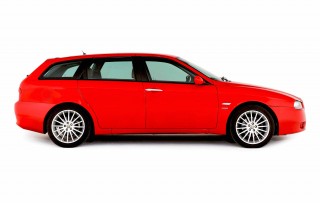2005 ALFA ROMEO 156 V6 SPORTWAGON Q-SYSTEM – Sportwagon from Japan
Have you ever owned a favourite car that, when the time came to replace it, production had ended and you couldn’t find a really good, low-mileage, well-maintained example? Well, there is a solution to this problem.

I have owned a string of Alfa Romeo 156s, mainly Sportwagons, from a 1.9JTD to a 2.4JTD ti to several 2.5 V6s. In my opinion, the combination of the 2.5 V6 and six-speed manual gearbox is a near-perfect specification. For my tastes, the shape and size of the Sportwagon is ideal and still attractive, especially the desirable post-2003 facelifted version. The UK market never received the V6 facelift so I became resigned to the fact that my ideal car was unobtainable.
Smitten by the fabulous Busso V6, I looked around for alternative models that shared this power unit. The obvious one is the 156 GTA Sportwagon, which has become highly collectable and priced accordingly. Many examples are now high-mileage, many have been driven hard, and under-body corrosion is an issue. Quite why Alfa Romeo opted not to facelift the GTA is also anathema to me, however I have seen and driven examples that have been retro-fitted with the facelift and they do look superb.
My other options were the 147 GTA and the GT 3.2. I discounted the 147 for similar reasons to the 156 GTA, plus I have never got on with the ‘frisky’ handling and hard ride. So I opted for a GT on the basis that there were still good low-mileage cars around at reasonable prices. Being based on a 156 chassis, I was expecting a similar driving experience but with more power. In reality, I found the GT’s handling ponderous by comparison, and gearchange less than sprightly. The 3.2 engine was certainly more powerful, but not as exciting as the 156’s revvy 2.5. Another minor irritation was wind noise from the frameless side windows. All in all, my GT 3.2 was not a car that I bonded with.
What to do next? I took to trawling auction sites for low-mileage facelift V6 156s, a fruitless search considering that the specification I wanted had never been available in the UK, although I have heard rumours of one in Ireland. I even considered building my own car by fitting a late facelift 1.6 or 1.8 with a V6, a project quickly dismissed on cost grounds, and the fact that these undertakings never turn out the way you expect them to be.
Research revealed that there were right- hand drive facelifted V6s elsewhere in the world, notably South Africa and Japan. The South African websites turned up a few cars but they were high-mileage and not particularly attractive. Japan, however, was a revelation. Japanese owners are fastidious about their cars and enthusiastic about Alfa Romeos, Abarths and Lancias. Numerous websites offer cars for export and it became evident that some Japanese-market models were never available in Europe, in particular the high-spec 156 ti fitted with a V6 engine and manual gearbox.
I found that the apparently automated responses in contrived English from Japanese websites did not inspire me with confidence. The prospect of buying a car sight unseen in Japan left me feeling very nervous. I needed advice.
Regular readers will know that the Ward family has owned a number of Fiat Coupes, most of them attended to by John Cartlidge at Midlands Car Services. John has imported numerous superb Coupes from Japan, some versions never available in the UK market. Given John’s no-nonsense approach and undoubted engineering expertise, I knew I would receive reliable information.
Taking advice from someone who has in-depth knowledge of the import system is essential. There are many pitfalls and unexpected costs for the unwary. Japanese websites are stocked with cars that have already been through auctions, or at least appear so. In reality, the tasty 2005 156 V6 Sportwagon in Misano Blue is only on the website to entice you. An enquiry about purchasing that car will likely reveal that, “It has already been sold but we have a similar one in stock.” A deposit is taken and the company goes off to auction to buy your dream car. Given that it can take six to eight weeks for a car to reach the UK, it has been known for deposits and/or cars to evaporate. There are rogues in Japan, too. The sale price on Japanese websites includes a quote for the car to be delivered to a UK port but they don’t indicate the costs of UK import duty, VAT, port expenses or delivery – costs that can easily double the sale price.
John Cartlidge has successfully imported around 40 cars from Japan, not all of them Italian. He employs an agent in Japan who arranges to purchase cars at auction and arrange the shipping. A website-based company would be more expensive to deal with, as it has to put its mark-up on the purchase, while an agent works on commission and is more reliable.
Based on previous auction sale values, John offers an all-in cost for the cars he locates. This includes all the duties and delivery – and he guarantees the condition of the car. No deposit is required and you pay on collection. You can’t get much fairer than that. I decided to go ahead and set my criteria for a low-mileage 2005 2.5 V6 156 Sportwagon in red or blue.
John set a price, which I agreed, and then I waited for a suitable car to come up. As it happened, I didn’t have to wait long. In a matter of days, I was emailed pictures of an immaculate red one-owner example showing just 56,000km (35k miles), with Q-System automatic transmission fitted. The time difference meant that John had to set an alarm for 3am to bid on the car. He was successful. The agent sent detailed pictures of the car post-auction and it did indeed look superb. Now I had an eight-week wait.
I received a call from John to say that the car had arrived at Midland Car Services, along with two yellow Fiat 20v Turbo Coupes in the same shipment. He reported that the lip on the front bumper had been cracked in transit and agreed to repaint it and also put the car through an MOT inspection. In the meantime, the DVLA provided an age-related 05 plate and a low rate of VED was calculated because the car had already been registered in another country.
The day came to pick up the 156 and I was astonished at the quality. The paintwork was near-perfect, apart from the rear bumper that had been repainted at some point by the previous owner in the wrong shade of red. The seats looked like they had never been sat on. Given that the paintwork was not ‘pink’ and that the car had covered less that 2000 miles a year since 2005, it had obviously been little used and carefully stored.
In common with any Italian car that has been stored for an extended period, the re-awakening process comes with a compilation of issues. The engine thermostat had seized, the air conditioning didn’t work, the fuel gauge was erratic and there were creaks coming from the suspension. The Japanese sat nav was unfathomable and, annoyingly, so was the service history.
The car was immediately booked in to Alfa-Workshop for a full service and it was revealed that spanners had rarely been anywhere near the engine, although the oil was clean. Jamie Porter’s troops went through the list and changed the belts, front discs, suspension wishbones (dry joints), engine top mount, radiator and thermostat. Although immaculate, the chassis was devoid of underseal (I’ve seen the lack of protection on other facelift 156s, sometimes only one side is covered!), so an overdue coat was applied.
One issue did take some time to rectify: the air con. The fault was hard to trace and quite bizarre. Apparently the air con fuse is shared with the cigarette lighter and it transpired that a small metal piece from an accessory plug was found in the bottom of the lighter socket, causing a short. The lack of air con in Japanese heat and the mounting list of servicing issues is probably a clue as to why the 156 came up for auction in the first place.
All attempts to make sense out of the Japanese sat nav failed miserably. The voice that appeared to be directing me to an obscure location 6000 miles away in Japan became irritating. A standard UK stereo was installed and the fitter explained why the 156’s windows were festooned with aerials, the sat nav unit also had satellite TV! I had not experienced a Q-System 156 since we road-tested one back in 1999. I was not into automatics back then, but given my advancing years and modern stop-start driving conditions, I now see the point. Having lived with my Japanese 156 for a while, I have grown to like the Q-System.
The bulletproof Japanese-made Aisin transmission offers three automatic driving modes (‘ice, ‘city’ and ‘sport’), plus a manual mode, selectable by shifting the gear lever to the left-hand sector, which has four ratios in an ‘H’ arrangement. In ‘ice’ mode, the car starts off in second gear to avoid wheelspin. ‘City’ changes up gear at around 3500rpm, while ‘Sport’ allows the revs to go to 5500rpm. The clutchless ‘manual’ gear lever function allows high revs in each ratio and provides engine braking during deceleration.
I use ‘city’ mode most of the time and find the gear changes to be really smooth, in fact almost imperceptible. On the road, the spacing of the four ratios can be limiting, especially when exiting a fast roundabout. Having said that, in this situation my previous six-speed manual Sportwagon didn’t like to pull third gear on exits, and was a bit hectic using second. There is a kickdown function on the Q-System for some extra oomph but I find that hitting the ‘Sport’ switch provides a more immediate response and that satisfying V6 soundtrack at high revs. So while you are searching for that low-mileage 156 V6, in Japan or elsewhere, don’t dismiss the Q-System.
CONTACT: Midlands Car Servicing/ John Cartlidge, Shepshed, Leicestershire. Tel: 07905 143 578. midlandscarservicing.co.uk
After a period of storage, many items needed to be fettled, including belts, rad, thermostat, air con, brakes and suspension.
OUR PREVIOUSLY OWNED 156 ALFAS
Alfa Romeo 156 Sportwagon 2.5 24V 2000
Alfa Romeo 156 ti Sportwagon 2.4 JTDm 2005
Alfa Romeo 156 Sportwagon 1.9 JTDm 2004
Alfa Romeo 156 Saloon 2.5 24V 2002
Alfa Romeo 156 Sportwagon 2.5 24V 2003





